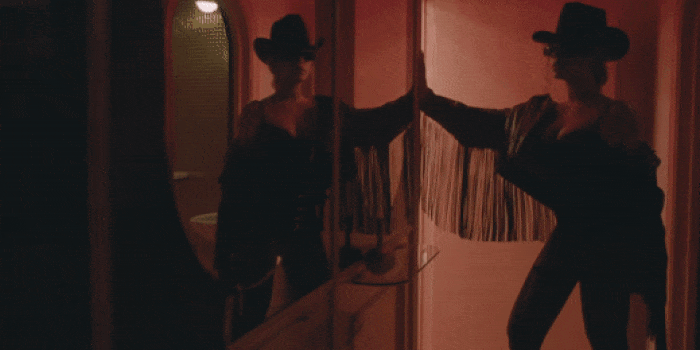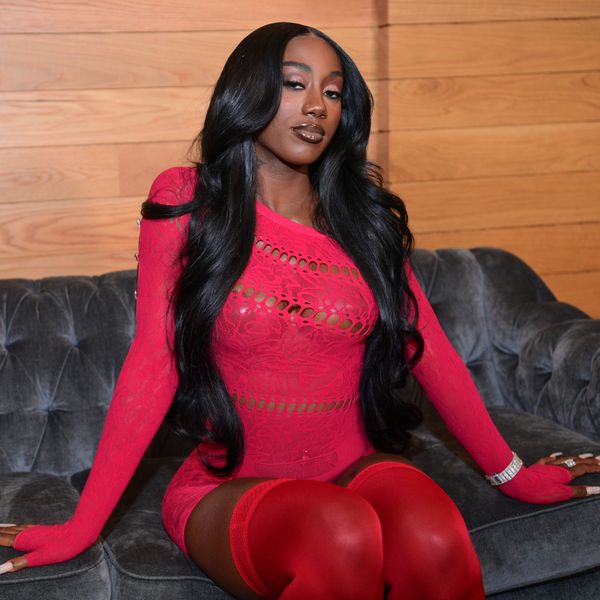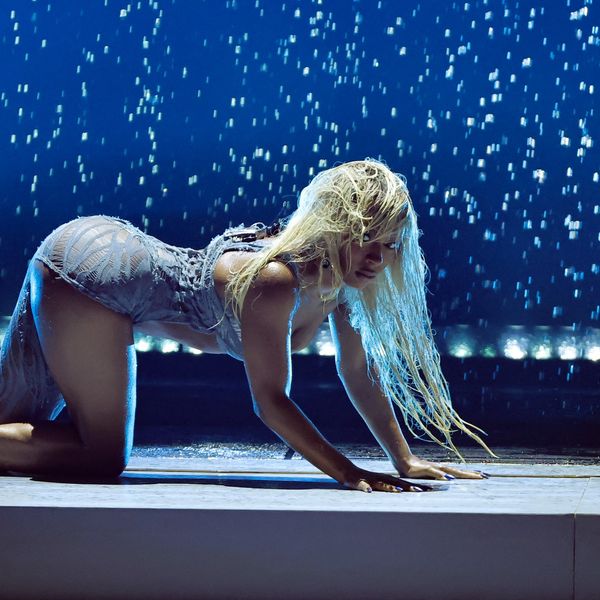
Beyoncé's 'COWBOY CARTER' Pays Homage To Our Roots & Dares Us To Exist In Any Space We Choose
Super Bowl Sunday Queen Bey struck again, snatching all our edges and keeping us in the same chokehold we’ve been in for the past couple of decades. After her Verizon commercial, where she alluded to her power to break the internet, Beyoncé essentially broke the internet with her announcement that Renaissance Act II would be released on March 29, 2024 (aptly titled COWBOY CARTER, we'd later learn) The final drop in this marketing masterpiece was the release of two new singles, “16 CARRIAGES” and “TEXAS HOLD ‘EM,” which have both soared to number one and two in the iTunes country music category.
However, despite the pure excitement by the BeyHive to follow Beyoncé wherever she leads them, there has already been pushback in the country music arena to deny the Queen access. Oklahoma station KYKC 100.1 FM denied a listener's request to hear Beyoncé’s new songs on its station because “We do not play Beyoncé' [sic] as we are a country music station," it responded via email.
This isn’t the first time Beyoncé has been dismissed in the genre. In 2016, when she released "Daddy’s Lessons" on Lemonade, she not only was met with backlash from country music fans but was also denied by the Recording Academy’s Country Committee after she submitted the record for a Grammy. In a March 19 update posted to Instagram, she alluded to that time as being the catalyst for her next body of work, saying she "did not feel welcomed" in that space, and that the forthcoming COWBOY CARTER was born from her experience of being excluded.
Beyoncé wrote, "This album has been over five years in the making. It was born out of an experience that I had years ago where I did not feel welcomed…and it was very clear that I wasn’t. But, because of that experience, I did a deeper dive into the history of Country music and studied our rich musical archive. It feels good to see how music can unite so many people around the world, while also amplifying the voices of some of the people who have dedicated so much of their lives educating on our musical history."

Beyoncé (2nd R) performs onstage with Emily Robison, Natalie Maines, and Martie Maguire of Dixie Chicks at the 50th annual CMA Awards in 2016.
Rick Diamond/Getty Images
She continued, "The criticisms I faced when I first entered this genre forced me to propel past the limitations that were put on me. act ii is a result of challenging myself, and taking my time to bend and blend genres together to create this body of work."
We saw a similar response to Lil Nas X’s "Old Town Road" in 2019 when the original single was removed from the Billboard Country charts because it didn’t “embrace enough elements of today’s country music.” Lil Nas X went on to win a Grammy with Billy Ray Cyrus for the song’s music video but was only accepted into the category after Cyrus joined for the remix.
Though the origins of the country music genre are an extension of Black culture and African ancestry, Black artists have been essentially erased from the genre's existence. Examples of this are the modern-day banjo – featured in many country songs – which is a descendant of the West African instrument, the Akonting. As with most things in American history, once white audiences were introduced to the banjo in a more “acceptable” manner through racist minstrel shows of the 1850s-1870s, it was quickly appropriated.
This unintentionally led to the creation of the 1920s Hillbilly music, which at the time was mainly popular in the South and later evolved into the country genre we know today. Hillbilly music drew its inspiration from slave spirituals, field songs, hymns, and the blues, which all originated within the Black community, and up until the end of World War I when major record labels rebranded it as country, the genre was successfully integrated.
In fact, in Patrick Huber’s 2013 essay, "Black Hillbillies: African American Musicians On Old-Time Records, 1924–1932," he details the vast diversity in the genre. In the time period chronicled, approximately 50 Black artists were featured on commercialized records within Hillbilly music. Huber’s essay was part of a larger work edited by Diane Pecknold, "Hidden in the Mix: The African American Presence in Country Music," which focused on the large contributions Black musicians had to the industry.

Michael Ochs Archives/Getty Images
Despite the huge success Hillbilly music had, record labels couldn’t fully capitalize on it while remaining diverse because of segregation throughout America. In order to market the music and artists to “mainstream” America, music executives not only segregated the genre but promoted it as “white music” and as white southerners migrated throughout the country, they took with them the ideology that country music was solely theirs. This eventually led to the erasure of Black artists and their contributions to their artistry and history.
These artists include DeFord Bailey, who was the first Black musician to play the Grand Ole Opry, and Charley Pride, the first Black person to be inducted into the Country Music Hall of Fame. Many of us know musical legend Ray Charles for his contribution to soul music, but it isn’t common knowledge that his ability to blend country, R&B, and pop music greatly influences country music to this day. Additionally, Gus Cannon made jug bands (an ancestor to country music) popular in the 1920s and taught Johnny Cash, who is a country music icon.
As we make efforts to honor and acknowledge the Black musicians who helped mold country music into what it is today, we must also acknowledge how the intersectionality of Black womanhood has practically left this demographic out of the country music fabric completely.
As Black women face both racism and sexism (a.k.a. misogynoir), their denial of entry has been easier to maintain in this genre. Linda Martell, the first Black female solo artist to play the Grand Ole Opry, released her debut album, Color Me Country, in 1970. Though still considered a pioneer to many, her career was short, and she faced relentless discrimination and violence within the industry that eventually led her to leave country music altogether. The documentary, Bad Case of The Country Blues: The Linda Martell Story, chronicles her experiences from 1969-1975.
Though there are many up-and-coming Black country music artists, Beyoncé's entrance into this arena creates a clear and imminent threat to the genre’s marketing strategy that it is “white music.” She might be one of the most unapologetically Black artist of our times, penning lyrics such as, “I like my baby hair with baby hair and afros” and “I like my negro nose with Jackson 5 nostrils.”
Argue with me if you like, but for the past decade, Beyoncé has been uplifting and celebrating Black culture and history.
She has made it clear that she has no desire to assimilate herself or her music into mainstream white culture. She is proud of who she is and where she comes from, which is why her making a country music album is a natural progression. Beyoncé's roots are in Texas, she often talks about her love for her state and her upbringing, and just as we heard in Act I of Renaissancewith the inspirations pulled from Chicago house, funk, soul, gospel, and New Orleans Bounce music; we will be serenaded by another layer of her upbringing and soul in Act II.
Beyoncé’s Renaissance is her unabashed way of not only using her stardom to prove that Black people are not a monolith but also paying homage to the Black artists who paved the way for her but are seemingly erased from history.
She highlights the multifaceted nature of Black culture and ignites conversations that force the full history of these genres to be represented and told. As a Black woman who grew up in Alabama and isn’t ashamed to share her love for country music, I was thrilled to hear "Daddy Lessons" in 2016 and I can’t wait for COWBOY CARTERto come out on March 29.
Whether you’re a member of the BeyHive or not, I hope you can see how Beyoncé’s musical evolution is allowing space for Black people, and moreover, Black women, to exist in whatever space they choose to pursue without feeling the need to diminish, readjust, or mold themselves into what someone else says you should be.
Through her art, she is creating a space for us all to live and exist in our fullness, or in short to live in true liberation.
Let’s make things inbox official! Sign up for the xoNecole newsletter for daily love, wellness, career, and exclusive content delivered straight to your inbox.
Featured image by GIF
This article has been updated.
This article is sponsored by Hulu.
UnPrisonedhas returned for its highly anticipated second season, delving deeper into the complex dynamics of the Alexander family.
The series premiere comes a year after its debut season garnered rave reviews from fans and critics and earned record-breaking ratings for Hulu's Onyx Collective brand. UnPrisoned's success can be attributed to its raw, relatable themes and comedic appeal.
Inspired by creator Tracy McMillan's life, the show follows Paige (Kerry Washington), a therapist and single mother whose life takes an unexpected turn when her father, Edwin (Delroy Lindo) --who was released from prison-- moves in with her and her teenage son, Finn (Faly Rakotohavana).
Throughout UnPrisoned's first season, viewers witnessed how Edwin's incarceration deeply affected Paige's life and relationships. In the series, Paige unpacks her trauma through interactions with her inner child and her online followers. Meanwhile, Edwin is overcoming specific struggles with his own past that led to his life of crime, including a dysfunctional upbringing and his mother's arrest. As the Alexanders attempt to reconcile, new challenges arise.
This new season promises to further explore their unconventional family dynamic. Here are several compelling reasons why season two of UnPrisoned should be on everyone's watchlist.
The Alexander Family Life Is Still In Shambles
UnPrisoned's second season resumes where the series left off, with Paige grappling with the fallout from her troubled therapy practice and Edwin navigating life independently after moving out. Meanwhile, Finn faces his own challenges. The teenager is battling anxiety and seeking information about his father—a topic Paige avoids discussing.
The Alexander Family Are Attending Therapy To Resolve Their Underlying Issues
Amid the chaos in their lives, the Alexander family decides to mend their bond by confronting their past traumas. They seek professional help and attend therapy sessions with a “family radical healing coach,” played by John Stamos, a new cast member. This collective effort aims to unravel the complexities of their shared history and strengthen their relationships.
The process of unraveling each character's internal conflicts and their potential impact on future relationships may clash with Paige's textbook therapy approach. While Paige is used to being in the therapist's seat in both career and family, this forces her into the unfamiliar role of a patient during therapy sessions. This shift would compel her to look in the mirror and try a radically different approach.
The Alexander Family Learned A Big Lesson During A Therapy Session
In therapy, the Alexanders are tasked with addressing their individual traumas to salvage their remaining relationships. One of the family therapist’s eccentric suggestions was an exercise involving a family wrestling match. During this session, Paige faces tough questions about her refusal to share information about Finn's father.
While it's unclear whether this scene is reality or fantasy, the image of the family duking it out in the ring certainly makes for hilarious yet compelling television.
Paige Tries Dating Again Following Failed Relationships
Amid her life's chaos, Paige decides to step back into the dating field. However, her many attempts have left her with mixed results. The dating apps have turned out to be a fail, and an outing with her ex Mal (Marque Richardson), who is also her father's parole officer, doesn’t go quite as expected after he brings an unexpected guest – his new girlfriend.
The situation takes an awkward turn when Mal's new partner learns why the former couple split, partly due to Paige's self-sabotage.
UnPrisoned Is A Perfect Balance Of Comedy And Drama
As a dramedy, UnPrisoned takes a comedic approach to its heavy subjects. The show takes us on a ride with Paige's dating misadventures and navigating a friendship with her ex.
Other lighthearted moments include Edwin's attempts at CPR based on online videos and, of course, the antics of the Alexander family's unconventional new healing coach.
The second season of UnPrisoned is now available on Hulu.
UnPrisoned | Season 2 Trailer | Hulu
Feature image courtesy
Tubi has been gaining popularity due to its free sign-up and a vast selection of series and films. According to Deadline, the FAST (free ad-streaming television) service has seen a 14.7% growth from May and now has similar numbers to Disney+. So while many people have joked about Tubi having low-budget movies, the numbers don't lie.
In fact, I was one of those people who didn't get the appeal of Tubi, but the more I watched it, the more I enjoyed the content. They have some of our favorite TV series, such as Scandal and Star, as well as big films like the Fast and Furious franchise and cult classic Love & Basketball.
Tubi even has its own original movies and series that are just as entertaining. But while Tubi is on the come up, some of the low-budget movies and hood movies are still a must-watch. From Tubi originals to the hood movies, we've put together a list of shows and movies to add to your watchlist.
Cinnamon
Cinnamon is an original Tubi movie that stars Hailey Kilgore (Juke from Power Book III: Raising Kanan), Damon Wayans, and Pam Grier. It's a love story gone awry after a robbery turns deadly, and a young couple faces many challenges to make it out alive.
The Dirty D
The Dirty D is one of the first things I watched on Tubi, as many people highly recommended it. It's a series set in a Detroit club, and it has all the drama you can think of. Murder, drug dealing, cheating, greed, and more.
Black Men Don't Cheat
In this film, a young woman grapples with the death of her husband while also discovering his secret life, which puts her in danger.
Mother May I
This movie fully captivates the overbearing mother. However, the ending will shock you as she goes a little too far.
The Stepdaughter
When a young girl moves in with her dad and his new wife, a series of unfortunate events occurs. This Tubi original will keep your attention with every turn.
These Men For Everybody
These Men For Everybody is a film that highlights the tangled web of friendships and relationships and how you can't trust anybody.
Best Friend
What happens when your best friend is obsessed with you? This movie, which stars Serayah and Marques Houston, answers this very question and takes us on a ride in the process.
What's Done After Dark
What's Done After Dark shows us that everything isn't always what it seems. The twist at the end is a real doozy.
Let’s make things inbox official! Sign up for the xoNecole newsletter for daily love, wellness, career, and exclusive content delivered straight to your inbox.
Feature image by rez-art/ Getty Images









